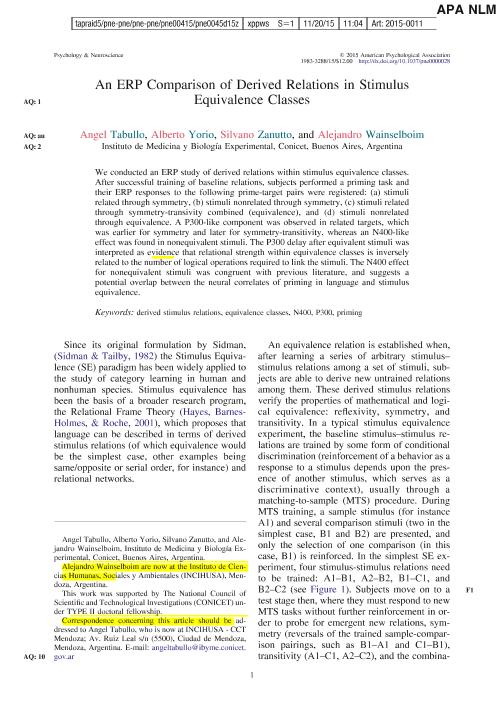Mostrar el registro sencillo del ítem
dc.contributor.author
Tabullo, Angel Javier

dc.contributor.author
Yorio, Alberto

dc.contributor.author
Zanutto, Silvano

dc.contributor.author
Wainselboim, Alejandro Javier

dc.date.available
2017-05-12T20:08:39Z
dc.date.issued
2015-12
dc.identifier.citation
Tabullo, Angel Javier; Yorio, Alberto; Zanutto, Silvano; Wainselboim, Alejandro Javier; An ERP comparison of derived relations in stimulus equivalence classes; American Psychological Association; Psychology and Neuroscience; 8; 4; 12-2015; 509-528
dc.identifier.issn
1983-3288
dc.identifier.uri
http://hdl.handle.net/11336/16415
dc.description.abstract
We conducted an ERP study of derived relations within stimulus equivalence classes. After successful training of baseline relations, subjects performed a priming task and their ERP responses to the following prime-target pairs were registered: (a) stimuli related through symmetry, (b) stimuli nonrelated through symmetry, (c) stimuli related through symmetry-transivity combined (equivalence), and (d) stimuli nonrelated through equivalence. A P300-like component was observed in related targets, which was earlier for symmetry and later for symmetry-transitivity, whereas an N400-like effect was found in nonequivalent stimuli. The P300 delay after equivalent stimuli was interpreted as evidence that relational strength within equivalence classes is inversely related to the number of logical operations required to link the stimuli. The N400 effect for nonequivalent stimuli was congruent with previous literature, and suggests a potential overlap between the neural correlates of priming in language and stimulus equivalence.
dc.format
application/pdf
dc.language.iso
eng
dc.publisher
American Psychological Association

dc.rights
info:eu-repo/semantics/openAccess
dc.rights.uri
https://creativecommons.org/licenses/by-nc-sa/2.5/ar/
dc.subject
DERIVED STIMULUS RELATIONS
dc.subject
EQUIVALENCE CLASSES
dc.subject
N400
dc.subject
P300
dc.subject
PRIMING
dc.subject.classification
Psicología

dc.subject.classification
Psicología

dc.subject.classification
CIENCIAS SOCIALES

dc.title
An ERP comparison of derived relations in stimulus equivalence classes
dc.type
info:eu-repo/semantics/article
dc.type
info:ar-repo/semantics/artículo
dc.type
info:eu-repo/semantics/publishedVersion
dc.date.updated
2017-05-09T18:04:04Z
dc.journal.volume
8
dc.journal.number
4
dc.journal.pagination
509-528
dc.journal.pais
Estados Unidos

dc.journal.ciudad
Massachusetts
dc.description.fil
Fil: Tabullo, Angel Javier. Consejo Nacional de Investigaciones Científicas y Técnicas. Centro Científico Tecnológico Conicet - Mendoza. Instituto de Medicina y Biología Experimental de Cuyo; Argentina. Consejo Nacional de Investigaciones Científicas y Técnicas. Centro Científico Tecnológico Conicet - Mendoza. Instituto de Ciencias Humanas, Sociales y Ambientales; Argentina
dc.description.fil
Fil: Yorio, Alberto. Consejo Nacional de Investigaciones Científicas y Técnicas. Centro Científico Tecnológico Conicet - Mendoza. Instituto de Medicina y Biología Experimental de Cuyo; Argentina
dc.description.fil
Fil: Zanutto, Silvano. Consejo Nacional de Investigaciones Científicas y Técnicas. Centro Científico Tecnológico Conicet - Mendoza. Instituto de Medicina y Biología Experimental de Cuyo; Argentina
dc.description.fil
Fil: Wainselboim, Alejandro Javier. Consejo Nacional de Investigaciones Científicas y Técnicas. Centro Científico Tecnológico Conicet - Mendoza. Instituto de Medicina y Biología Experimental de Cuyo; Argentina. Consejo Nacional de Investigaciones Científicas y Técnicas. Centro Científico Tecnológico Conicet - Mendoza. Instituto de Ciencias Humanas, Sociales y Ambientales; Argentina
dc.journal.title
Psychology and Neuroscience
dc.relation.alternativeid
info:eu-repo/semantics/altIdentifier/doi/http://dx.doi.org/10.1037/pne0000028
dc.relation.alternativeid
info:eu-repo/semantics/altIdentifier/url/http://psycnet.apa.org/?&fa=main.doiLanding&doi=10.1037/pne0000028
Archivos asociados
